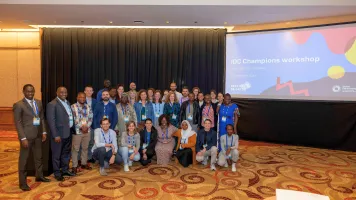Three years ago, when the Government of Sierra Leone decided to make education data a priority, they did not know how many classrooms or teachers there were in the country—a legacy of fragile data systems. Today it’s a different story. Investment in data has transformed the understanding of what keeps children out of school, driving data-led policies to support teachers, schools and students, and building a more inclusive education system.
The story of education in Sierra Leone, and the role data is playing, feels particularly critical this week as countries and leaders meet at the Global Education Summit. The Summit comes at a precarious time for education globally. The disruptions caused by COVID-19, combined with the years-long disaster of underfunding, is creating problems for children and young people across the globe now and storing up a catastrophe in years to come.
The education crisis is all the worse for being hardest to see among those who are most affected. A quarter of all children in the world have still not had their births registered by the age of five. These are the poorest and most vulnerable children, in the poorest countries. It means governments don’t know they exist—and who will build a school for a child that doesn’t exist?
It’s those who are most invisible who are most in need of support. If census enumerators don’t reach far-flung villages to count the children, then schools won’t be built there. If schools don’t distinguish between girls’ and boys’ results, they can’t track gender inequalities. If countries don’t know how many households lack internet access, they can’t make sure that all children can access education remotely in a pandemic.
Education is the single most important route to reduce inequality, and data is a critical tool to fight inequalities in education. That’s why a core pillar of global investment in education must be investment in education data systems. I am constantly impressed at the use of data to help understand how children are progressing and to identify when they are not. That’s exactly what we have seen in our work with the Government of Sierra Leone. Over the last few years, the government has prioritized education, trying to understand what is keeping children and young people out of the classroom. For that, they’ve needed data.
Access to education in Sierra Leone has long been extremely limited. The average adult has only 3.5 years of education. Literacy rates are below 50%. When the government joined our Inclusive Data Charter as a champion in 2019, the data system was basic at best, and critical education data was difficult to compile. Data collection often relied on paper-based questionnaires. Data was rarely captured that could be disaggregated by gender or disability. Limited alignment on data systems and processes meant that data was scattered across many agencies and institutions without a central analysis hub.
Changing a data system is a political challenge as much as a technical one. Data is a source of power for institutions who control it, and a source of anxiety for people whose information is collected and stored in ways they may not understand or consent to. To get a system where people willingly hand over their information, and where that information is shared and used wherever it can do most good, is about trust as much as it is about technology.
The first thing, then, was to get everyone around a table to agree on what the problem was and how to fix it. We worked with the government to get the relevant institutions talking to each other – different parts of government, as well as the private sector, civil society and community groups involved in delivery and advocacy on education from outside of government. They had to come to a common understanding of what the challenge was, and agree their priorities for what to do to solve it: getting better data on gender; and modernizing the system to use technology to get faster and more accurate data.
This paid off almost immediately. The data showed quickly that in one district, Port Loko, girls had some of the highest rates of teenage pregnancy and some of the lowest rates of school enrollment in the country. Without up to date data, disaggregated by gender and available by district, this would have been invisible, and girls would have continued to be denied an education.
This data was used by advocates who were campaigning to end a government policy banning pregnant girls from school—a ban which was overturned in 2020. It was also used by planners, who built a new girls secondary school in Port Loko in the same year.
The new school is continuing the drive for using data to improve education in the country, as a centre of excellence for learning and teaching innovation which aims to develop, test, and evaluate evidence-based learning and teaching methods in collaboration with students, educators, parents, and policymakers, with best practices scaled up across Sierra Leone’s public education system. Data to define the problem, data as part of the solution.
In three years, Sierra Leone has demonstrated how investments in data, and political commitments to use that data to improve people’s lives, can pay off in the form of better policies and programs that will change lives for children and young people.
Our mission is for every country to have the opportunity to use the best data to solve one of the greatest challenges in the world today. We owe it to the future to take action and make investments in data systems across the globe now to build the education system that creates the world we want to see tomorrow.
Read our case study on supporting girls education in Sierra Leone through inclusive data systems here.
This blog has been adapted from keynote remarks given at the 2021 EduData Summit 2021.

